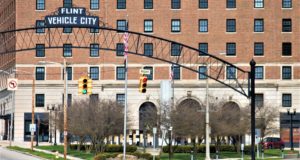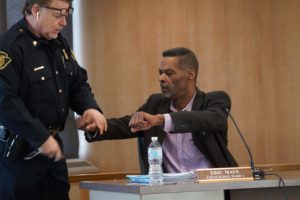By Paul Rozycki
For much of the 20th Century Flint was a leader for much of what mattered in the nation. It was home for one of the largest manufacturing corporations in the world. It was the place where one of the most progressive and influential labor unions in the nation stood up to that corporation and negotiated a labor agreement. It was known for its premier public school system. It was where a major foundation built a Cultural Center that rivaled many larger cities. It was where the first Black mayor of a major city was chosen.

A vehicle city arch in downtown Flint. The historic Durant Hotel in the background. (Photo by Tom Travis)
Dysfunction nationally
Today that reputation as a leader may still hold true, but in a very different direction. In recent weeks, we watched the U.S. House fumble for four days, in its attempt to pick a speaker, as Kevin McCarthy sold his soul to a handful of Trump loyalists. Yet, the dysfunction we see in the national government has been part of Flint politics for some time.

U.S. Capitol in Washington D.C. (Photo source Architect of the Capitol website. www.aoc..gov)
Will the turmoil over choosing a speaker make it more difficult to for the U.S. House to produce any meaningful policies? At the moment it seems the likely prospect. To win the speakership, McCarthy gave up a lot of power to a small cluster of Republicans who may limit his options for the future. After 15 votes on what normally is a routine process, will they be able to agree on any major policies? The last time the House took this long to pick a speaker was just before the Civil War.
Dysfunction locally
The Flint City Council has become a poster child for governmental dysfunction and conflict as meetings drift into the early morning hours with endless requests for “point of information” as members accuse each other of racism, and some are led out in handcuffs by police.
Perhaps learning from the city council, the Flint Board of Education has shown similar discord and dysfunction, as members assault each other, and spend endless hours bickering over small issues as the Flint schools crumble and enrollment drops.
At the University of Michigan-Flint it remains to be seen how they will deal with the proposed changes to their curriculum amid protests from faculty, staff, and the local community. Many are worried that, in spite of all the community forums, the University will pursue its own agenda in remaking the campus. Some fear that the survival of the campus is at stake.
What does it mean for government?
What does all this mean for the trust we have in government and its institutions?
On one hand, it may be entertaining to watch members of Congress assault each other, see Kevin McCarthy’s poker face as he endures 15 frustrating ballots, Eric Mays being led out of council chambers in handcuffs, or two school board members punch each other out during a meeting.

Councilperson Eric Mays (Ward 1) putting his hands out to be cuffed after he was removed from a city council meeting. (Photo by Tom Travis)
Sitting through a meeting that reviews the annual budget line-by-line or examines new zoning regulations is almost certainly less compelling than the conflict and turmoil we’ve seen on both the national and local level. After all, a story about a train wreck is more exciting than one about a train pulling into the station safely and on time.
But that dull meeting over the budget (and similar topics) is the real business of government, and the dysfunction has led to a dramatic distrust in all institutions. That distrust can have profound implications for the future of democracy.
The threat to democracy
Yes, democracy can be a messy process, but in the end we expect it to deliver the goods. While it may be entertaining, exciting, and interesting to watch all the chaos and conflict at all levels of government, that conflict poses some real dangers. We expect something from a well-run democratic government, and when it can’t deliver, it’s natural to turn elsewhere. That ‘elsewhere’ is often a dictator or an authoritarian ruler who promises “Only I can do it, if you give me the power.” As government grows more dysfunctional and less trusted, the tendency is for the public to drop out and become less involved. As distrust grows, it becomes easier to believe the wildest conspiracy theories floating around social media. And as distrust grows, some turn to violence, as we have seen with the attempt to kidnap Michigan’s governor, and threats against election officials.
Trust in the government has been declining for decades. In the mid-1960s, 77 percent of the public felt that government would do the right thing “just about always or most of the time.” Today that number is about 20 percent. We’ve seen that with the Flint water crisis; local voter turnout has declined, we’ve grown more cynical of what government can do.
We are learning that the events of Jan. 6, where an organized mob tried to overturn the 2020 election were hardly unique. The recent events in Brazil and several European nations have seen a similar rise in right-wing actions and distrust of democracy.
There were many reasons for the rise of Hitler in Germany in the 1930s, but the dysfunctional Weimar Republic of the 1920s, and the Great Depression, helped set the stage.
Any signs of optimism?
For as divided as the nation is today, there are some glimmering hopes that the partisan divisions are wearing thin, and the nation just might be willing to move in a more positive direction. Increasingly some candidates are promising to work across the aisle and the word “bipartisan” is showing up more frequently as they make their pitch for votes. Words are one thing. Action is something else. We’ll see if the words lead to real cooperation.
On the local level, the Flint Board of Education has just elected five new members, defeating all the incumbent candidates. Melody Relerford, Claudia Perkins, Dylan Luna, Terae King. and Michael Clack were elected, and they have pledged to work together. All of the new officers of the board are newly elected members. They are: President Michael Clack, Vice President Terae King Jr., Secretary Claudia Perkins, and Treasurer Dylan Luna.

Voters standing in line outside Flint City Hall during the November 2020 election. (Photo by Paul Rozycki)
With his recent reelection and State of the City address, Mayor Sheldon Neeley has made an attempt to reach out to those on the council that he may have offended, and has indicated his desire to work with them in a more productive way.
While the Flint City Council and the Flint Board of Education often divide along racial lines, Genesee County Sheriff Chris Swanson stepped out of his riot gear and walked with the “Black Lives Matter” protesters as Flint avoided much of the turmoil of that summer two years ago.
The University of Michigan – Flint is at least holding focus groups and town halls to listen to community concerns about the changes planned for the Flint university, and an independent group of faculty, staff, students, and alumni also have been sponsoring town halls. We’ll see how well university officials listen and what actions are finally taken.
On the state level, Gov. Gretchen Whitmer has a Democratic majority in the legislature for the first time in 40 years. But it is a narrow majority and she will often need to work with Republicans to get things done. With a potential budget surplus this year, there seems to be some real conversation between the parties over the budget and taxes in Michigan.
The federal level may be the most challenging. Already the Republicans in the U.S. House have begun to prepare investigations of Hunter Biden, the Jan. 6. committee, the FBI, and Pres. Biden’s classified documents. In that atmosphere, bipartisan cooperation may be difficult to achieve. One critical decision is the need to extend the debt limit, to avoid a serious economic crisis. Maybe, just maybe, that threat may bring some bipartisan co-operation.
If Flint’s local governments can begin to work together and rebuild trust, could Flint again be a model for the nation?
It’s at least something to hope for.
EVM political commentator and board president Paul Rozycki can be reached at paul.rozycki@mcc.edu.


You must be logged in to post a comment.